#Pulp Magazines
Text

THRILLING WONDER STORIES (vol. 10, #2) October, 1937. Cover by Howard V. Brown.
This magazine was edited by a teenaged Mort Weisinger, future editor of the Superman family of books at DC Comics. It also seemed to feature an awful lot of kaiju-like giant monsters on its covers.
#Thrilling Wonder Stories#science fiction#pulp magazines#Golden Age kaiju#Mort Weisinger#Howard V. Brown
26 notes
·
View notes
Text
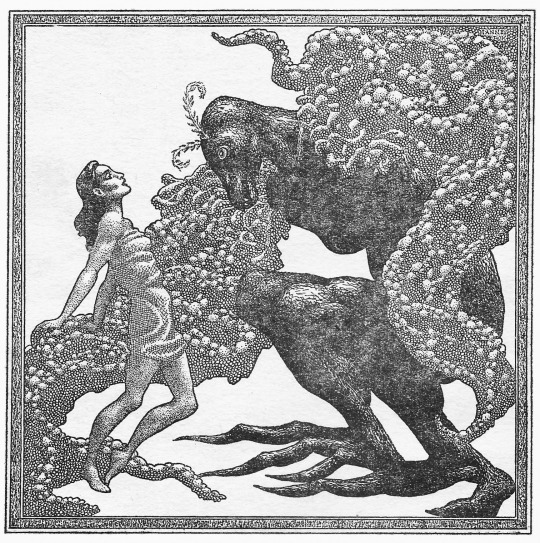

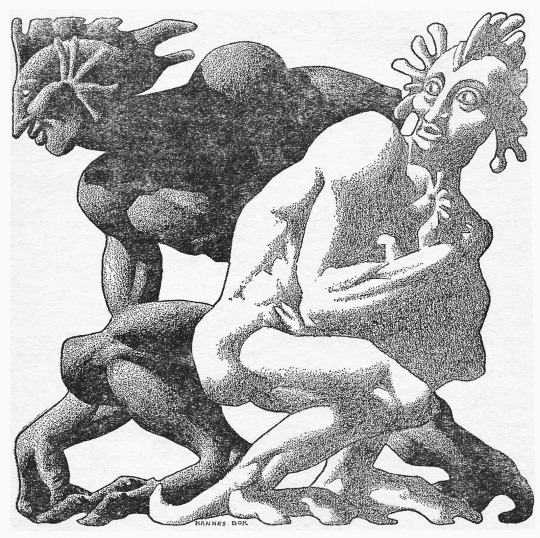
Hannes Bok (1914-1964), ''Super Science Stories'', Vol. 1, #4, 1940
Source
#hannes bok#Wayne Francis Woodard#american artists#Super Science Stories#pulp magazines#science fiction art#scifi art
553 notes
·
View notes
Text

Secret Suspense Confessions #1 - 'I Was Satan's Virgin Bride' ~ September 1968.
139 notes
·
View notes
Photo
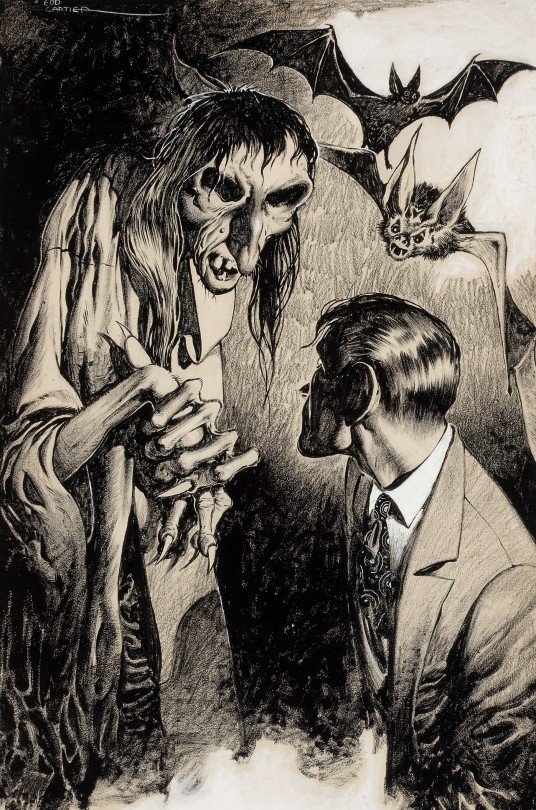
Confronting the Witch - art by Edd Cartier (c.1940)
425 notes
·
View notes
Text
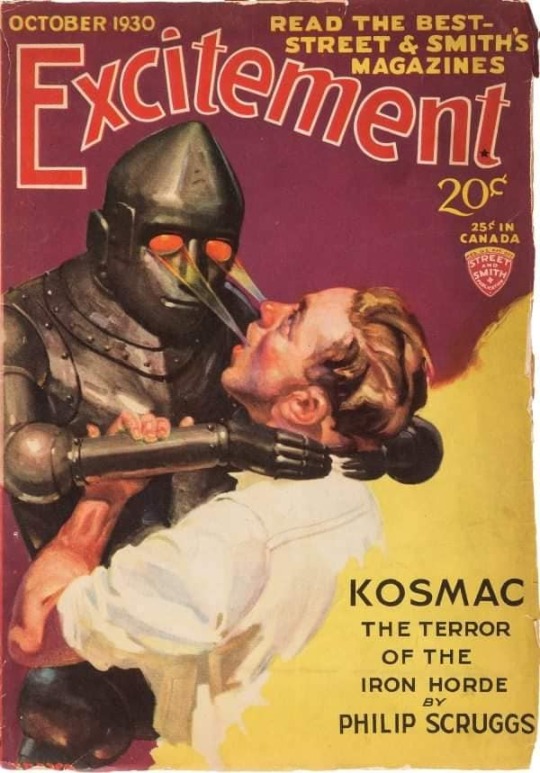
EXCITEMENT magazine (Smith & Street, 1930)
Art: Jerome Rozen
#excitement#pulp#pulp magazine#pulp magazines#pulp fiction#pulp science fiction#pulp sci fi#golden age science fiction#golden age#golden age sci-fi#sci-fi#sci fi#science fiction#smith and street#smith & street#pulp art#vintage scifi#vintage science fiction
28 notes
·
View notes
Note
Where can I read pulp novels like The Shadow and Doc Savage?
Archive.org is so much, much more than just the Wayback Machine. For posterity, they have completely digitized a tremendous amount of scifi and horror and adventure pulps, all available for reading and downloading in PDF, including the following:
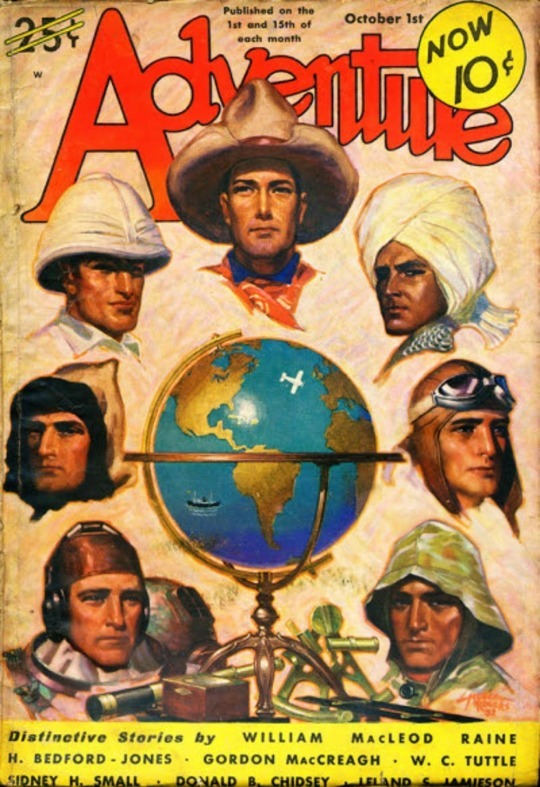
Adventure. Of the big two pulps, they have the entire golden age of possibly the greatest pulp mag of all time, Adventure, from 1914-1930, when they had Talbot Mundy's mystic adventures in Central Asia and India, and Harold Lamb's tales of the Mongols and Cossacks. It's incredible to just flip through them and find things like articles where people talk about what it's like to be bitten by a snake, or a firsthand account of the Italian invasion of Abyssinia, or polar exploration from the air. The stories are just the beginning, and in reprints, they don't include the fact they have wonderful maps of where the story is set.
Argosy is also available, the very first pulp magazine ever made starting in 1896. So you can read, among others, the first stories of Zorro, Tarzan, and fantasy novelist A. Merritt, as well as find letters pages where you see the weird prose H.P. Lovecraft, who the other letters that wrote in response did nothing but make fun of him. It's like witnessing cyberbulling in 1914 mixed with crank youtube comments.
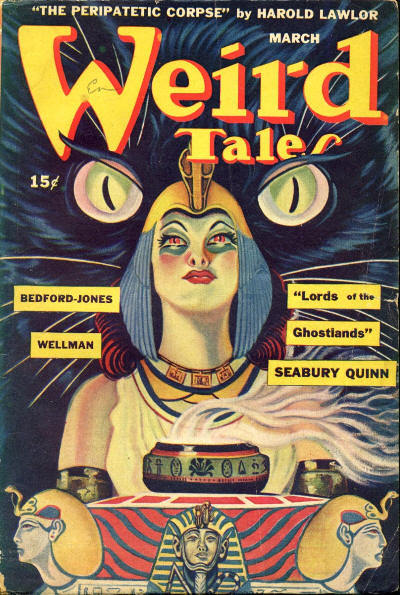
Weird Tales. Speaking of Lovecraft, they also have almost the entirety of Weird Tales. Unlike Adventure and Argosy, which sold in the millions, this one was a low seller, but through Robert E. Howard (creator of Conan) and the incredible worlds of Clark Ashton Smith (the true genius of Weird Tales), and the space adventures of C.L. Moore.
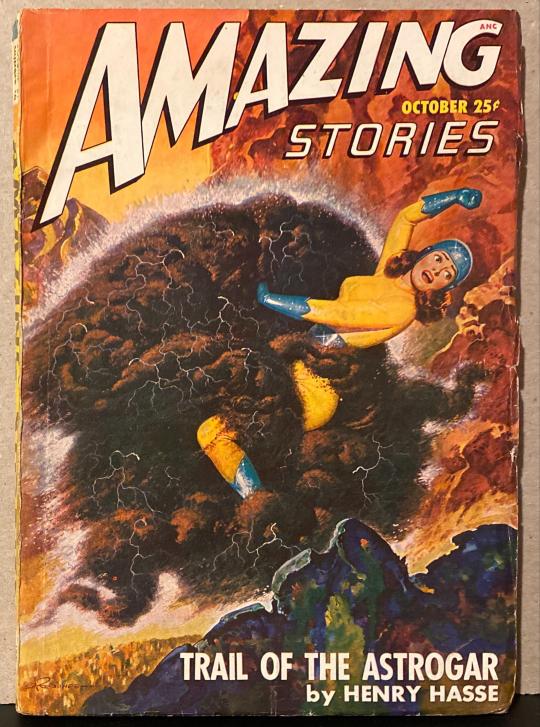
The first ever scifi pulp magazine, Amazing Stories, is available for reading. It created geek culture as we know it as he encouraged fans to message each other. So geek culture as we know it started in 1928 so a Luxembourg American weirdo could sell radio parts.
Don't sleep on a few of the minor ones. My favorite is Unknown, which has amazing work by L. Ron Hubbard, one of the best early fantasy and horror novelists. There's also A. Merritt's Fantasy, a reminder of a time he was THE name in Fantasy.

Unfortunately the hero pulps were mostly published by Street and Smith and are therefore not in Public Domain, but for those, there are great, cheap collections available that I recommend, especially as they have great historical material added by William Murray, pulp historian.
271 notes
·
View notes
Text

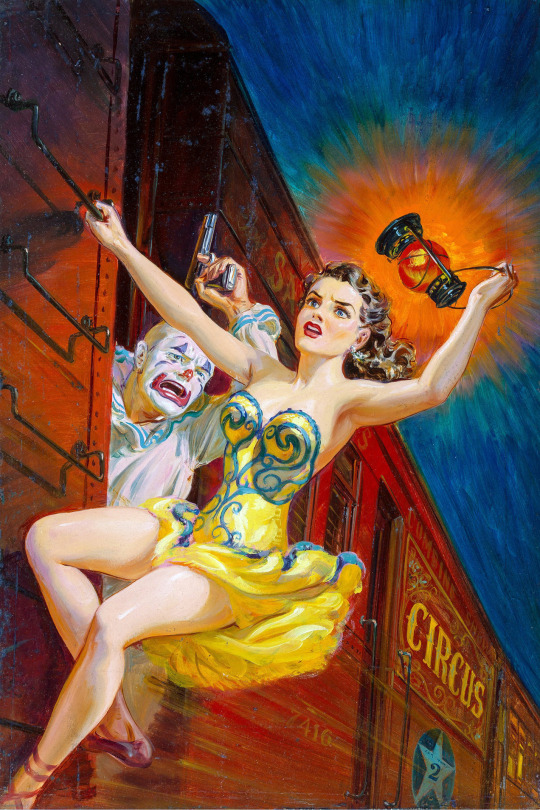




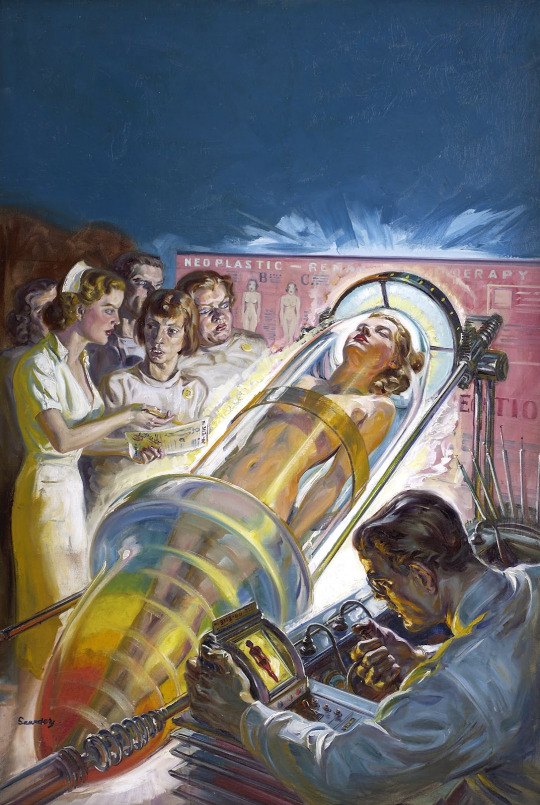

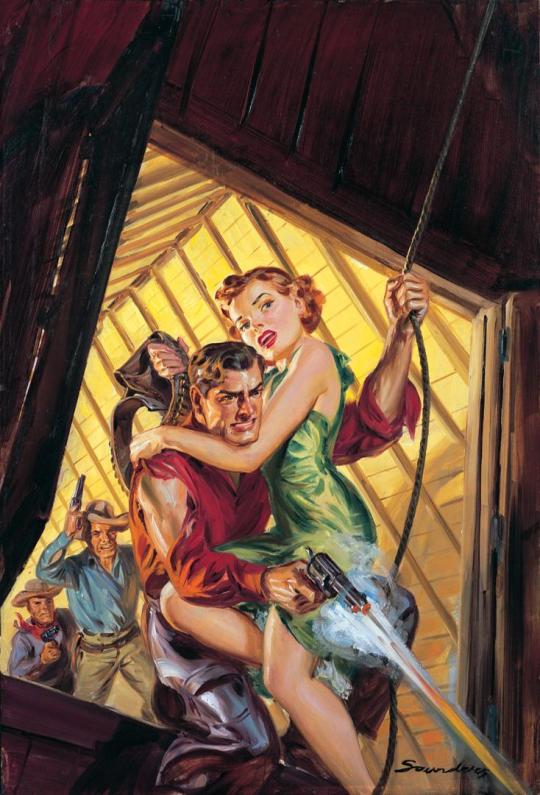






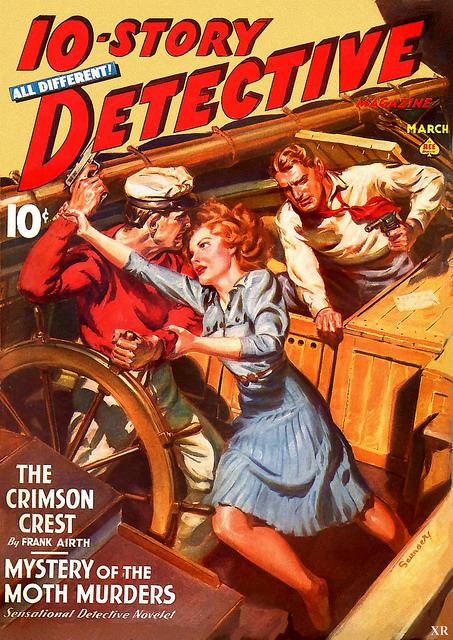
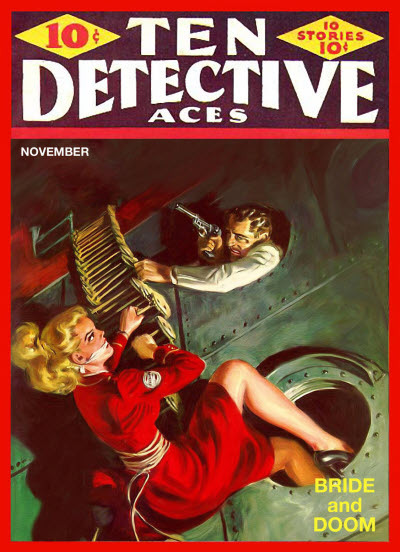



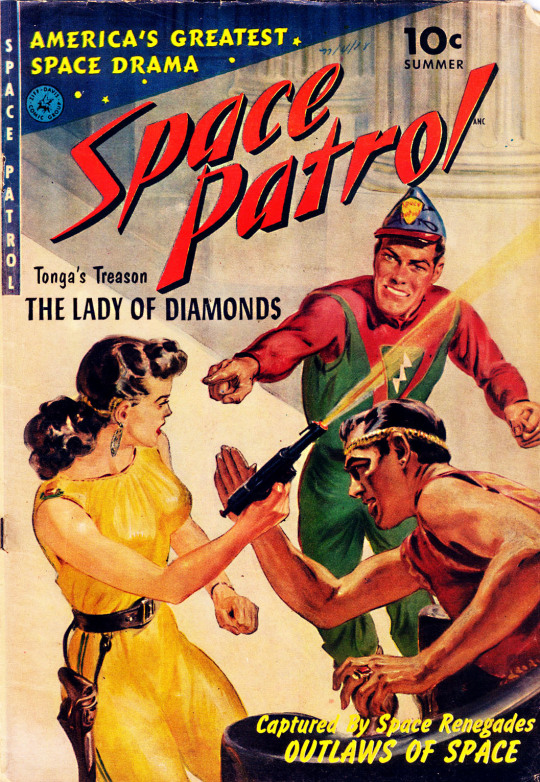
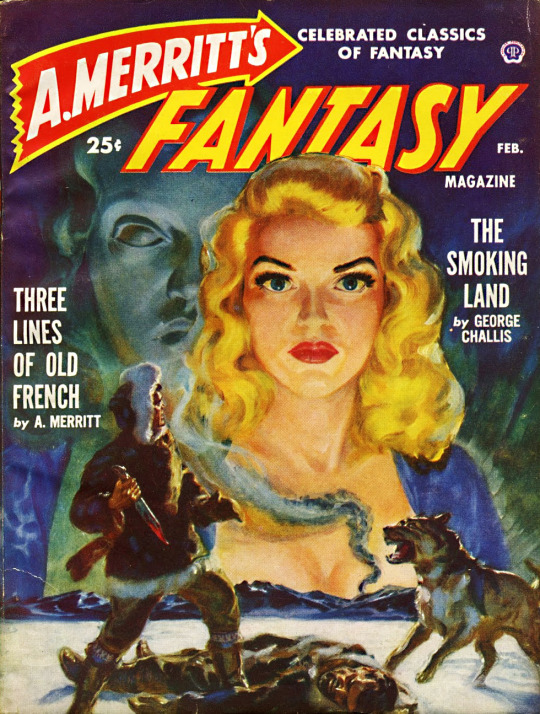
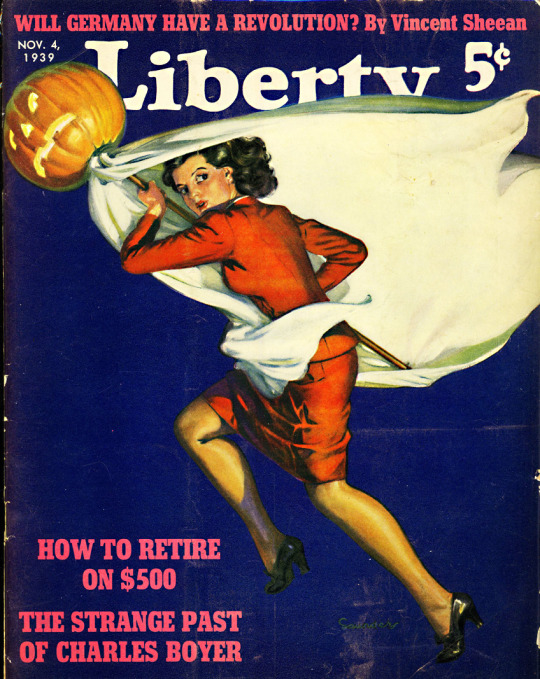

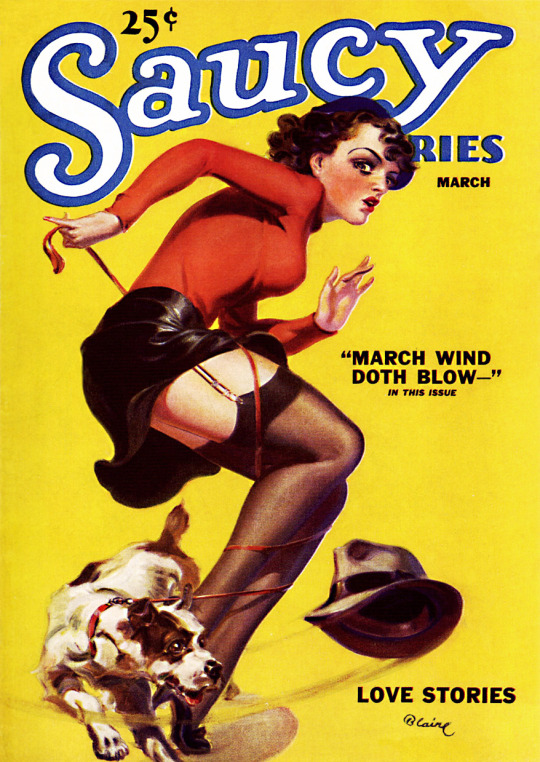
Showcasing art from some of my favourite artists, and those that have attracted my attention, in the field of visual arts, including vintage; pulp; pop culture; books and comics; concert posters; fantastical and imaginative realism; classical; contemporary; new contemporary; pop surrealism; conceptual and illustration.
The art of Norman Saunders.
46 notes
·
View notes
Text
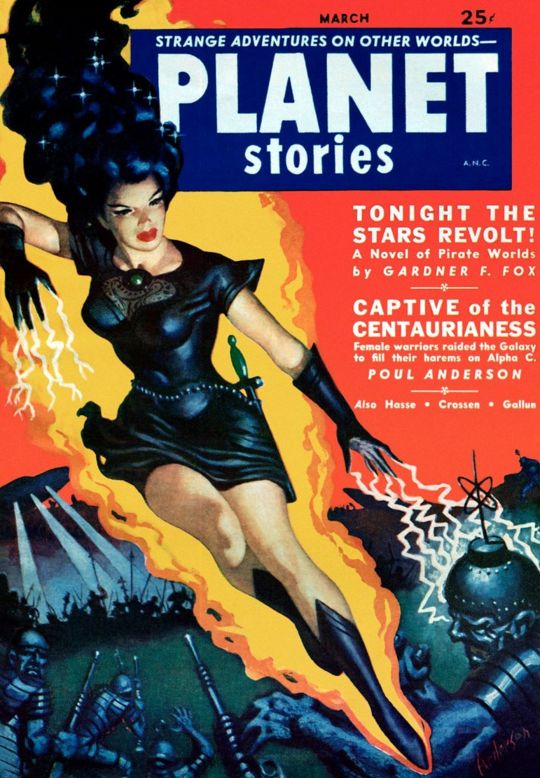
Planet Stories, March 1953
Art by Allen Anderson
13 notes
·
View notes
Text
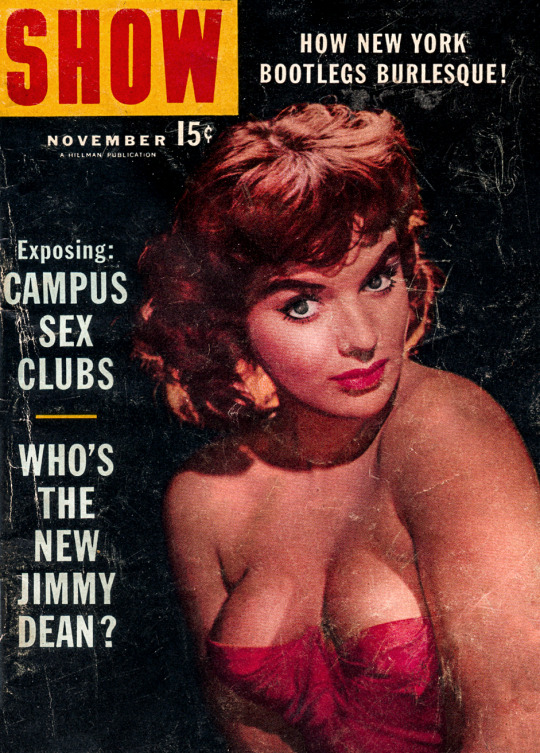
Show Magazine - November 1956.
4 notes
·
View notes
Text

The Magazine of Fantasy & Science Fiction
#my posts#hypnosis#hypnotism#science fiction#sci fi#vintage#pulp magazine#pulp science fiction#pulp sci fi#pulp magazines#fantasy#fantasy and science fiction#pulp magazine art#pulp fiction#the magazine of fantasy and science fiction#vintage science fiction#vintage sci fi#vintage fantasy
17 notes
·
View notes
Text

Alan Hunter (1923-2012), ''Dark Horizons'', #10, 1974
Source
#alan hunter#dark horizons#pulp magazines#horror fiction#black & white illustration#black and white illustration#fantasy art#horror art
341 notes
·
View notes
Text

Weird Tales - October 1937 (Popular Fiction). Cover art by Margaret Brundage.
92 notes
·
View notes
Photo
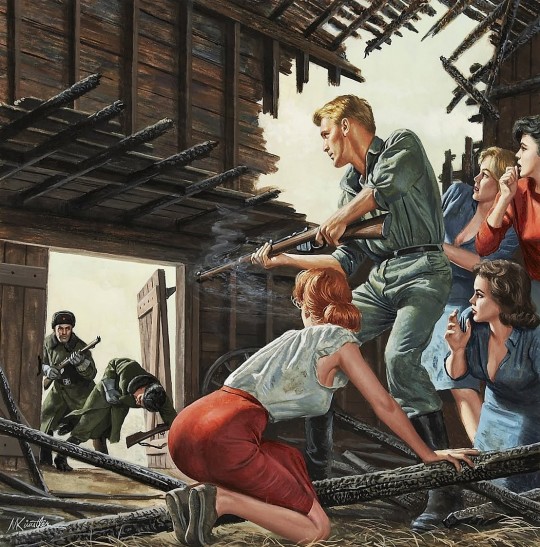
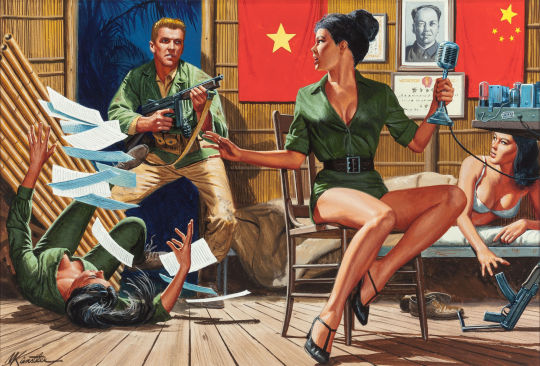


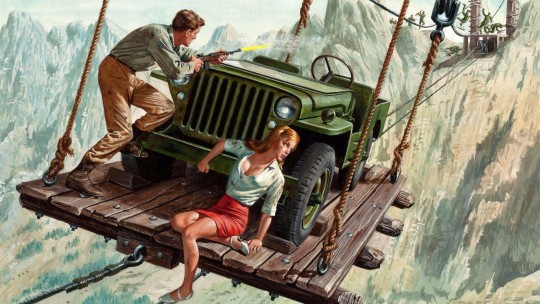
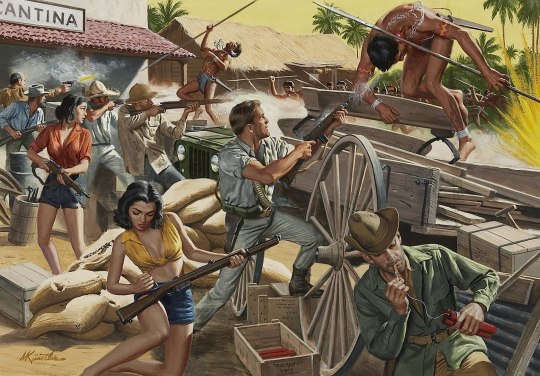

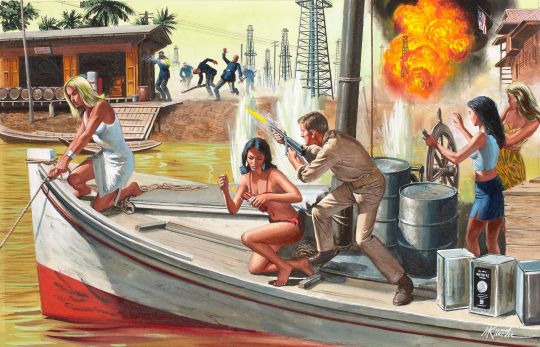

art by Mort Künstler
#mort künstler#emmett kaye#mort kunstler#pulp art#cover art#men's magazines#pulp artist#pulp magazines#adventure#spy-fi#illustrations#sixties#1960s
311 notes
·
View notes
Text

AMAZING STORIES #8 (Experimenter Publishing, 1928)
"Buck Rogers Armageddon 2419 AD" - first Buck Rogers appearance.
#pulp#pulps#science fiction#pulp science fiction#pulp art#sci fi#scifi#pulp sci fi#pulp magazine art#hugo gernsback#gernsback#pulp magazine#pulp magazines#buck#buck rogers#buck rogers in the 25th century
49 notes
·
View notes
Note
Speaking of Pulp Heroes and their rather more fraught relationship with the authorities than their 4-Color successors when I read the first couple Secret Agent "X" stories, it felt like he has a buffoonish cop nemesis solely because the writer felt the genre's tropes required him to have a buffoonish cop nemesis. So. Why do so many Pulp Heroes feel a need to have a cartoon caricature of Inspector Javert in their cast?
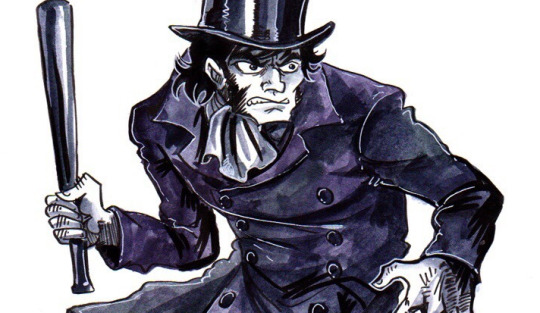
(Inspector Javert art by dasha-ko)
The simplest answer is that much of it can be chalked up to the importance pop culture osmosis plays in how we construct stories, especially when we're explicitly trying to reference existing tradition or building off an established mold. So much of superhero fiction's origins are built off the American pulp stock and trade, and so much of that in turn is owed to the British and French pulp fiction. And when people look at the history of detective/crime fiction history and it's origins, and the role of characters like Arsene Lupin's Ganimard, Fantomas' Juve, Jacques Closeau, Harvey Bullock, Zenigata and so on, they quite reasonably assume that, much like how tight circus costumes are grandfathered into the superhero concept, it's assumed that every Gentleman Thief protagonist needs a Ungentlemanly Cop arch-nemesis / annoyance, because that's just how the concept works. The longer answer means that we gotta talk about Inspector Javert specifically, and why he ended up becoming such an imitated touchstone for pulp fiction.
The fact that so many of them take up after Javert specifically is interesting in itself, because it's not just a result to Javert being one of the most popular mainstream examples of "bad cop" characters and thus the go-to example when you want your cops and detectives to be, at a minimum, dumb obtrusive goons who can have a change of heart and, at worst, one-note villains who usually still aren't quite bad to overshadow the more interesting villains and piss off real cops who are a million times worse than what you can usually show in fiction get in trouble with audiences for disrespecting authority. In some ways, they miss the point of Javert, but also expand on the point Victor Hugo was making with him and the novel as a whole, which was in some ways a response to what the serialized fiction tradition was like at the time, as part of Hugo's intended aim of advocating for social reform:
So long as there shall exist, by reason of law and custom, a social condemnation, which, in the face of civilization, artificially creates hells on earth, and complicates a destiny that is divine, with human fatality; so long as the three problems of the age—the degradation of man by poverty, the ruin of woman by starvation, and the dwarfing of childhood by physical and spiritual night—are not solved; so long as, in certain regions, social asphyxia shall be possible; in other words, and from a yet more extended point of view, so long as ignorance and misery remain on earth, books like this cannot be useless
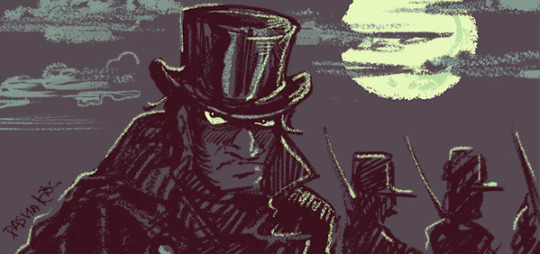
A lot of people miss the fact that Javert did not exist in a vacuum. He wasn't just designed to be a criticism of law enforcement and a rotten cop or whatever, he was explicitly based on Inspector Eugéne Vidocq. Claims about his real life achievements are countless and self-aggrandizing and none of them matter here except for one fact: His memoirs published in 1829 are said to be the bedrock where this entire concept of "detective fiction" started, at least in the anglo-sphere (although his effect loomed globally). Vidocq was not only the inspiration for Javert (as well as Valjean), but he was also the inspiration for Rodolphe de Gerolstein in The Mysteries of Paris, Monsieur Lecoq who would go on to inspire Holmes, and long before that he inspired Edgar Allan Poe's C.Auguste Dupin, who was an unflattering take on Vidocq, and is considered the first fictional detective.
Detective fiction existed some ways before Poe's Dupin via magazines and newspapers, as the concept of the "private detective" started taking form circa the turn of the 19th century and, as all new things tend to develop, fiction started to develop about them, largely thanks to the memoirs and autobiographies of officers like Vidocq, to the point that by the 1830s, virtually all detective fiction was about private detectives. I'm linking this thread on the Pinkertons that Jess Nevins wrote on Twitter here, in case more of you wanna dive deep into where this grody copaganda business took it's baby steps to sink it’s teeth into fiction to never let go, but the point being: For about half a century, the whole concept of the Great Detective, the central figure of detective fiction and of much of popular fiction as a whole, was based on Inspector Vidocq, and that was what Victor Hugo was responding to when he made Javert. He was based on The Super Cop, the Cop of the Century for that era, and here's another dirty secret that even most Les Mis adaptations get wrong about Javert: He IS a Super Cop. In-universe, he's the best damn cop in the whole world.

He is without vices, but upon occasion will take a pinch of snuff. His life is one of privations, isolation, self-denial, and chastity—never any amusement
He would have arrested his own father if he escaped from prison and turned in his own mother for breaking parole. And he would have done it with that sort of interior satisfaction that springs from virtue.
He is every bit the incorruptible paragon of order and devotion that people tend to attribute to characters like Jim Gordon. He’s honest to a fault to a point he insists that, if he were to be dishonest, he should not only be resigned, but also punished, should he commit any injustice on others. Other cops in the story dislike and distrust him specifically because he’s not corrupt. He’s as unrelentingly hard on himself as he is to everyone else, and it literally kills him the second he’s forced to grow a seed of conscience towards those he spent his entire life oppressing. He is, by basically every metric, a Good Cop, an unusually good cop at that, and he is a bad, rotten person, because that’s what it takes to be a good cop. He isn’t bad because he’s “one rotten apple”, he isn’t bad because he’s just too obsessed with one particular man, he is bad specifically because he’s a good cop, and he is very good at serving a terrible system, and he is very good at enduring and enforcing it’s cruelties, and the moment he is forced to question to it, when he’s no longer a “good cop”, he kills himself because that’s his way of resigning from life.
He had lost his bearings in this unexpected presence; he did not know what to do with this superior (convict); he who was not ignorant that the subordinate is bound always to yield, that he ought neither to disobey, nor to blame, nor to discuss, and that, in the presence of this superior who astonishes him too much, the inferior has no resource but resignation. But how to manage to send in his resignation to God? - Victor Hugo
It was a very damning perspective that Hugo was putting forth with this character, not just as a criticism of law enforcement, but also as an open dialogue with pretty much the entirety of the feuilleton traditions that informed the century, of the uncorruptible, inscrutable, unfailingly correct detectives stomping on wicked criminals, a condemnation somehow more timeless in 1863 than countless other takes on the story across the couple of centuries since that downplayed what exactly Hugo was getting at and why Javert was that way. Javert was a response to almost 50 years worth of how the entire concept of detective fiction worked and was seemingly supposed to work forever. So, obviously when it was time for others to twist the concept further and start focusing on the daring thieves and arch-criminals for a change, well, if these characters are supposed to stand against the law at it’s mightiest and get away with it, and you don’t quite feel like buggering Conan Doyle again, what other archetype are you gonna invoke as the allmighty, yet failed, representative of the power of The Law?

(Pictured: Inspector Zenigata, Inspector Lunge fan-art by admhire, Hank Schrader)
The Javert / Inspector has become an ubiquitous staple not just of fiction that stars gentleman thieves that, even when they are not specifically modeled after Javert, they often hit on many of the same notes that made Javert so enduring and potent of a character. It’s kind of almost a necessity, if you’re writing a story that focuses on a criminal, to see what does the law enforcement he opposes on some level looks like, and it makes for some pretty varied and interesting characters, often with some of the most interesting dynamics these stories have to offer.
Sometimes you get characters who actually do need to be serious and heroic, if only because of the sheer scale or menace of what they’re up against, and because they don’t get to win, they can be played for tragedy, characters like Inspector Juve or Hank Schrader, who is interesting as he is very much not a Javert-kind of character at first and probably never would have come close to being one, if he didn’t find himself thrust into the position of Heisenberg’s arch-nemesis and thus had to try and make himself into the extraordinary pursuer of justice, to disastrous consequences. Zenigata’s one of a kind as, somehow both a Super Cop as well as the absolute worst cop alive and only one by the thinnest thread possible (which is part of why he’s ultimately sympathetic, because his morals usually come first and he will team up with Lupin to solve bigger problems), a more deranged nutjob than the entire gang of master thieves he keeps up with. He stretches the broad strokes of the Javert archetype to such an extreme while still remaining ultimately a moral character that he winds up becoming as much of a cop as Mario is a plumber, and an indispensable part of the gag while still being very much not just a gag character.
Lunge’s on a totally opposite end of a similar scale, in that he’s a direct response to Javert as well as Holmes, demonstrating what an unflinching obsessive devotion to the law as well as a restless genial crime-solving brain does to someone who is not afforded a protagonist safety net or that sheen of fantasy most fiction affords these characters: it basically leads him to torpedo his life of everything that doesn’t get him to capture the criminal he mistakenly pursues, and it doesn’t bring him any step closer to stopping the real mastermind either, and it’s not until he owns up to his mistakes and starts to understand the story he’s in that he starts to actually help.
You can play these characters up as seriously, or as comedically, as you’d like. Sometimes they are overzealous clowns who never stood a chance and exist to make our protagonist and other villains seem cooler by comparison, and sometimes they make for such hilariously “bad” cops that they actually end up being pretty decent and even potential allies (like Chase Devineaux from Carmen Sandiego). Often, they can be a concentrated amalgam of the writer’s own feelings towards law enforcement and policing and carceral systems and whatnot, which often makes them complicated in ways even the authors don’t quite intend them to be.
A massive part of why we enjoy these kinds of stories comes in the form of transgressive fantasies where people can trick or escape or overpower or even take over and change the systems that routinely make life so difficult for us. So much of detective fiction stars police protagonists because they place readers in the shoes of getting to be the ones with the power of the jackboots for a change, but copaganda is not synonymous with detective fiction, and hasn’t been for well over a hundred years, much of it for so long has reveled in characters who are not police or police-adjacent. These characters often stand, in turn, as many things that you might need a cop in the story for, almost like a concentrated focal point.
Maybe you want to explore the ramifications of law enforcement in your fantasy world, maybe you do believe that cops can still be salvageable and you want to show what a “good one” would look like in your view, maybe you can’t think of them as anything other than distractions at best and chief enforcers of all wrong with the world at worst, or maybe you just put em in there so you can go “Oh, what would the cops do about my hero? They would hate them because they’re too cool and they would suck at stopping them, end of story, let’s move on to more interesting stuff”.
They aren’t always the most interesting characters, especially when they are just 1-to-1 Javert clones who remain neutral or mistake the point of Javert for simple-minded obsession, but they are always very telling characters, and they are not just a crucial archetype for what makes this kind of fiction work, but also a very significant touchstone of it’s inception and how far it’s come, and often, just fun to have around to make idiots of themselves, when fiction lets us get away with that. Fiction lets us get away with softening the edges of a lot of things we need outlets to confront safely (what else lets us do that?), this being one of them. Even when they suck, and they’re pretty much made to suck most of the time, I’m glad this archetype stuck around.
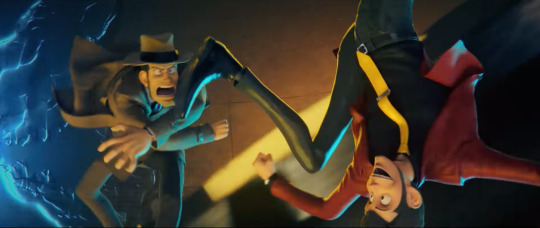
#replies tag#pulp fiction#pulp magazines#les mis#les miserables#javert#Lupin III#lupin the third#zenigata#arsene lupin#lupin#detective fiction
90 notes
·
View notes
Text
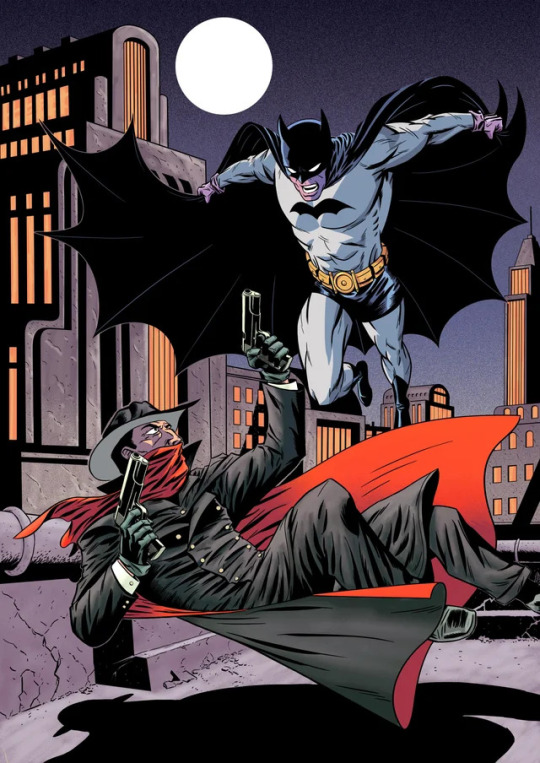
Dakota Alexander
#batman#the shadow#artwork#fan art#superheroes#comic books#pulp magazines#pulp heroes#dc comics#dc universe
12 notes
·
View notes